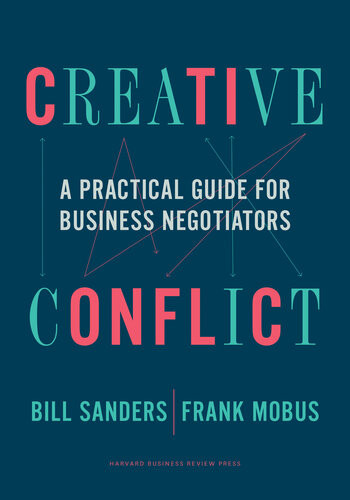

Most ebook files are in PDF format, so you can easily read them using various software such as Foxit Reader or directly on the Google Chrome browser.
Some ebook files are released by publishers in other formats such as .awz, .mobi, .epub, .fb2, etc. You may need to install specific software to read these formats on mobile/PC, such as Calibre.
Please read the tutorial at this link: https://ebookbell.com/faq
We offer FREE conversion to the popular formats you request; however, this may take some time. Therefore, right after payment, please email us, and we will try to provide the service as quickly as possible.
For some exceptional file formats or broken links (if any), please refrain from opening any disputes. Instead, email us first, and we will try to assist within a maximum of 6 hours.
EbookBell Team

4.3
28 reviewsNegotiation is stuck. It's time for something new.
Almost everything is negotiable. Almost every interaction is a negotiation. And in no field is this clearer than in business, where every day we work with others to get things done. But when we have real differences, is win-win always possible? Or must every negotiation be a zero-sum battle, with a winner and a loser?
Over the last half century, two opposing philosophies have ruled the field of negotiation: the win-lose, tooth-and-nail approach of training guru Chester Karrass; and the win-win, "principled" creed of Getting to Yes, developed by Roger Fisher and William Ury. But neither approach fully meets the challenge of today's volatile, disruptive, ultracompetitive business environment, where strategic problem-solving is of critical importance.
In Creative Conflict, negotiation experts Bill Sanders and Frank Mobus provide something new. They use a dynamic, dialectical approach to show how negotiations are driven by competition and cooperation at the same time. Counterintuitively, they reveal that conflict lies at the heart of more profitable agreements. They believe that when we tiptoe around conflict, we negotiate in a half-hearted way that limits our results. By contrast, creative negotiators probe and push until they hit a wall of disagreement, and then they figure out how to get past it. The authors construct a clear and useful framework based on three distinct negotiating contexts: Bargaining, Creative Dealmaking, and Relationship Building. They instruct readers on how to skillfully pursue their fair share while simultaneously seeking ways to expand a deal's scope and value for both sides.